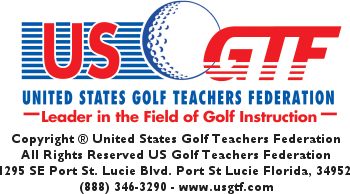ARE YOU A True Professional?
 Over the years, I have had the opportunity to observe golf pros at various clubs and academies all over the country. There are a number of good, even great teachers. Then there are the select few that I term “true professionals.”
Over the years, I have had the opportunity to observe golf pros at various clubs and academies all over the country. There are a number of good, even great teachers. Then there are the select few that I term “true professionals.”
True professionals are not necessarily the highest skilled players of the game; however, this group makes me proud to tell people I am a teaching pro. True professionals dispel every stereotypical negative myth about our profession and are ambassadors for our sport. I have listed some qualities that are necessary for a candidate to be a true professional.
Talks With, Not To, Club Members and Clients
A true professional greets and speaks with all members, whether or not they are taking lessons from him. True professionals make others feel important. They remember little details that make people feel good. For instance, a true professional may say, “So Jane, tell me how is Joshua (her grandson) doing?” True professionals genuinely care about people, members and clients and it shows in how they speak with them. They have no ulterior motive. They are not directly selling anything.
RETURNS PHONE CALLS
True professionals return telephone calls within 24 hours. This may sound like common sense, but in a lot of cases it does not happen. Sure, we all say we should do it, but then come the excuses. I use the analogy of a second serve in tennis. Either you get the ball in the correct box or it is a fault. No excuses!
RESOLVES CONFLICTS WELL
Understand that conflict can be a good thing and must be resolved in a win-win fashion. This applies to conflict both on and off the golf course. It’s easy to be nice, but you must be nice and be able to resolve conflicts. This requires a sense of balance and diplomacy. A true professional is an expert at resolving conflict. In fact, some are so good at it that they actually look forward to the challenge!
MASTERS TIME MANAGEMENT
True professionals are masters of time management. They do not take the path of least resistance or make excuses. “I did not finish the assignment because play on the course was too slow today,” is not something you will hear from a true professional. A true professional plans his work and works his plan. They respect the value of other people’s time and do not waste it.
Some top time wasters are:
Not prioritizing daily, weekly and monthly assignments.
Not attaching a time frame to how long you will spend on a specific task. An example is planning to work on a golf report, which will take a full hour, between a lesson that finishes at 10 and another that starts at 11am. This is a recipe for disaster. First, after your lesson, it will take 10-15 minutes to get back to your desk. By the time you’ve checked voice mails and said hello and been disturbed by colleagues (yes, plan on that!) it will be 10:30. Not enough time has been allotted to complete the hour long task. Why not plan to work on this report at 7-8am, before the day and all the interruptions that come with it begins?
No organized filing system. A sure sign of this is a lot of paper and post-it notes lying all over the desk.
Saving the least appealing task for last or doing unimportant tasks just to avoid tackling it. My mother used to say, “Do what you dread first and then there will be nothing to dread.”
Gossiping with students and fellow teaching professionals. I am not suggesting you become anti-social; however, if you are still talking about that 300-yard drive you hit in a local tournament in 1980, you might need some help in this area.
MAKES EDUCATED, LOGICAL DECISIONS
A true professional has the ability to make intelligent decisions. Specifically, they understand the decision making process including: • THINK before making a decision. There is conclusive data to support my theory that the mouths of several of my fellow golf teachers work independently of their brains.
THINK before telling a student, “I can’t believe the range ball machine is acting up again. That’s the second time today. Management should really do something about that.”
It is more important to be fair and respected than to be cheaply popular. Let’s face it – our students think we can walk on water just because we can teach them how to correct a slice. In our business, it is easy to be popular! Besides being popular, a true professional is respected due to his or her ability to make fair decisions.
Write down the pluses and minuses of making a decision before making it public. Benjamin Franklin used to do this and just look at all the fair and wise decisions he made.
Once you have made your decision, act on it! Do not procrastinate implementation!
IS COMPUTER LITERATE
True professionals have a basic working knowledge of computers, especially writing programs and spreadsheets. In this age, to not know how to create a spreadsheet with appropriate formulas is unacceptable. A true professional will also use computers for lesson plans, payroll, tournaments, e-mail, etc.




